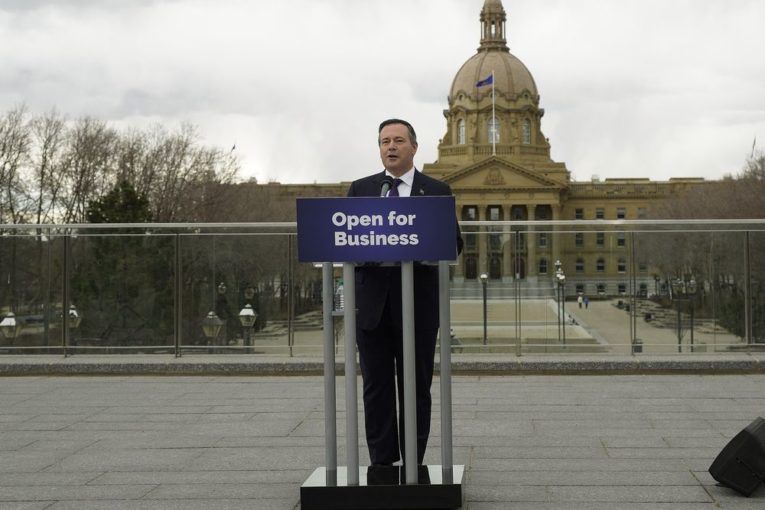
Jason Kenney has played the part of federal cabinet minister, political populist and campaign fighter.
Now, he has to assume the role of skilled negotiator.
If the incoming premier wants to kick-start Alberta’s economy, he must coax investment back into Canada’s beleaguered energy sector.
He also has to make sure the Trans Mountain pipeline expansion (TMX) is restarted by the federal government in short order.
“He may have to tone down the rhetoric if we are going to get something done with Ottawa,” University of Calgary business professor Harrie Vredenburg said Wednesday.
“Getting TMX approved and getting shovels in the ground within the next couple of months is priority No. 1. After that, everything else follows.”
In his victory speech Tuesday, Kenney focused heavily on the importance of the province’s oil and gas sector to creating more prosperity in Alberta.
He pledged his United Conservative Party government will kill the carbon tax and stand up to opponents of the industry. The government will also cut regulations, speed up project approvals and lower the corporate tax rate.
For the oilpatch, these are all welcome developments.
For Kenney to succeed, he needs industry to grow and create jobs.
The tandem issues of attracting investment and seeing pipeline progress are inextricably linked if Alberta’s economy is to get back on track.
Additional pipeline capacity means more oil can flow out of the province, which should unlock future investment for the sector. However, there’s no point in growing output if your oil sells at steep discounts due to transportation bottlenecks.
Without new oil pipelines, the links in the chain pull apart.
For Alberta, more pipelines are necessary and TMX needs to be approved by the federal Liberal government sooner rather than later.
“The first step is to send a signal to capital markets that Alberta is back in business,” said former Alberta energy minister Ken Hughes.
“The pipeline file is going to be a burning issue until we get shovels in the ground for one or more” projects, he added.
So how does Kenney get that done?
The UCP leader frequently made Prime Minister Justin Trudeau the target of his attacks during the provincial campaign, but Kenney struck a more conciliatory tone the day after the election smoke cleared.
The incoming premier told reporters he spoke with Trudeau on the phone for 15 minutes Wednesday, discussing energy issues and the federally owned pipeline that ships oil from Alberta to the Pacific coast.
The project was thrown into limbo last August by a court ruling, and the federal government is now redoing consultations with First Nations before cabinet makes a final decision on the development in the coming weeks.
“The prime minister restated his commitment to proceed with the process,” Kenney said in Edmonton.
“I respect that (consultation) has to be done correctly and take time to pass muster for any future judicial scrutiny.”
Kenney, who will be sworn in as Alberta’s 18th premier on April 30, said it was a “respectful conversation” with the prime minister. They agreed to have a face-to-face meeting in the future.
“We will begin with a path of diplomacy and trying to find common ground,” he added.
“We hope that we don’t need to use more forceful measures to assert Alberta’s vital economic interests.”
It’s encouraging the two leaders weren’t battling from Day 1, although a big chasm remains between the two sides over climate policy.
In initially approving the Trans Mountain project in 2016, Trudeau specifically cited Alberta’s climate plan as a key consideration in the decision.
The strategy included a carbon tax and a 100-megatonne cap on oilsands greenhouse gas emissions, policies adopted by the Notley government that Kenney has vowed to scrap.
The limit on emissions is seen as essential to the Trudeau government meeting its international climate change commitments made in Paris.
In an interview, Natural Resources Minister Amarjeet Sohi said the federal government remains committed to building Canada’s pipeline capacity.
He also stressed Canada needs a credible climate plan that includes Alberta.
“That plan has to be comprehensive. It just can’t be a phoney climate change plan. So we will watch how things proceed,” Sohi said.
You don’t have to be professional diplomat to understand what’s at play.
Ottawa needs the oilsands emission cap. Alberta needs Trans Mountain to be built. Can the two sides find common ground?
It remains to be seen if Kenney is prepared to use the cap as a bargaining chip or if Ottawa — having already paid $4.5 billion for the pipeline — would walk away from its expansion without the emissions limit in place.
Expect this tricky issue to be an early test of the relationship between the two governments.
While that high-stakes game unfolds, the oilpatch was welcoming Kenney’s emphasis on revitalizing the sector.
Gary Mar, CEO of the Petroleum Services Association of Canada, said the mood in the industry is more optimistic, although there’s widespread recognition many factors critical to industry’s success — such as pipelines — remain beyond the province’s control.
“I would say there has been a significant change in confidence,” said Mar, a former provincial Progressive Conservative cabinet minister.
“There were, among our members, some saying that they were prepared to move their head office out of Alberta if there wasn’t a change in government.”
Others were less direct, but the message was similar.
CAPP president Tim McMillan said Kenney’s victory will enable Alberta “to regain and to reset its position as an investment jurisdiction.”
To make that all happen, pipelines must be built.
The new premier is inheriting an old problem that needs to be fixed, but perhaps the touch of a new negotiator is just what’s needed.
Chris Varcoe is a Calgary Herald columnist.
You can read more of the news on source
